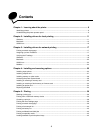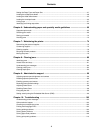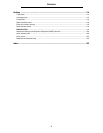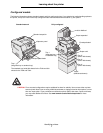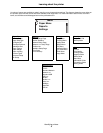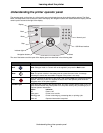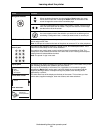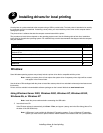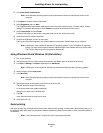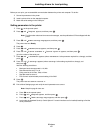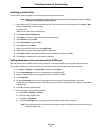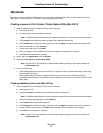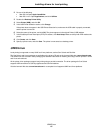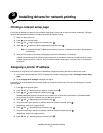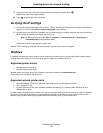
Installing drivers for local printing
11
2
Installing drivers for local printing
A local printer is a printer attached to the computer using a USB or parallel cable. The local printer is intended to be used by
the computer to which it is attached. If attaching a local printer, you must install the printer driver on the computer before
setting up the printer.
The printer driver is software that lets the computer communicate with the printer.
The procedure to install drivers depends on the operating system used. Use the following table to find driver installation
instructions for the particular operating system. For additional help, see the documentation that shipped with the computer
and your software.
Windows
Some Windows operating systems may already include a printer driver that is compatible with the printer.
Note: Installing a custom driver will not replace the system driver. A separate printer object will be created
and appear in the Printers folder.
Use the drivers CD that shipped with the printer to install the custom printer driver and obtain enhanced printer features and
functionality.
Drivers are also available in downloadable software packages on the Lexmark Web site at www.lexmark.com.
Using Windows Server 2003, Windows 2000, Windows XP, Windows 98 SE,
Windows Me, or Windows NT
Note: Install the printer software before connecting the USB cable.
1 Insert the drivers CD.
If the CD does not launch automatically, click Start Æ Run, and type D:\Setup.exe in the Run dialog (where D is
the letter of the CD-ROM drive).
Note: USB support is not available for Windows NT operating systems. To use a Windows NT operating
system, you must have an optional Parallel 1284-B Interface Card installed and use a parallel cable.
Operating system Go to page
Windows 11
Windows Server 2003, Windows 2000, Windows XP, Windows 98 SE, Windows Me,
Windows NT 4.x
11
Windows 95 and Windows 98 (first edition) 12
Serial printing 12
Macintosh 15
UNIX/Linux 16



